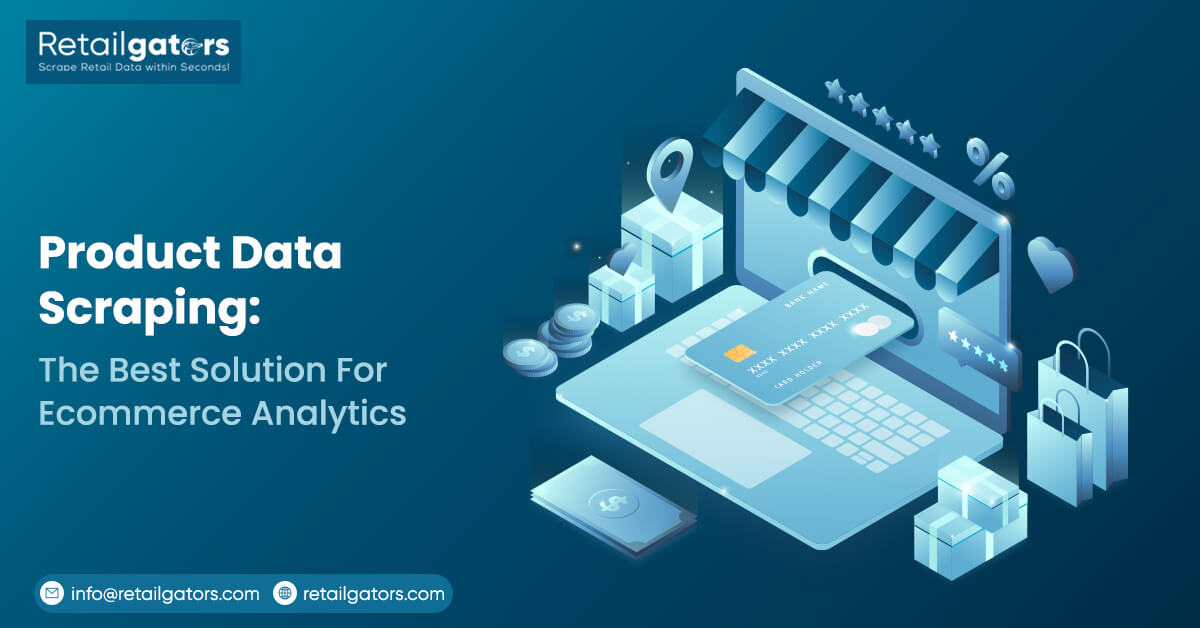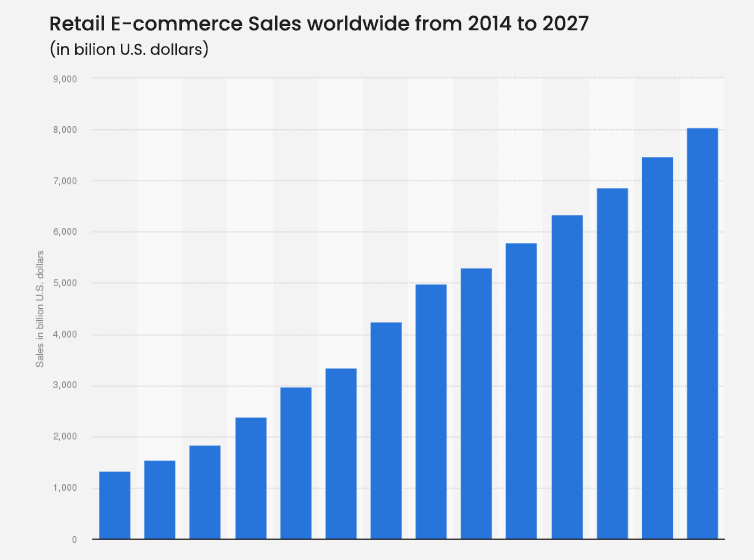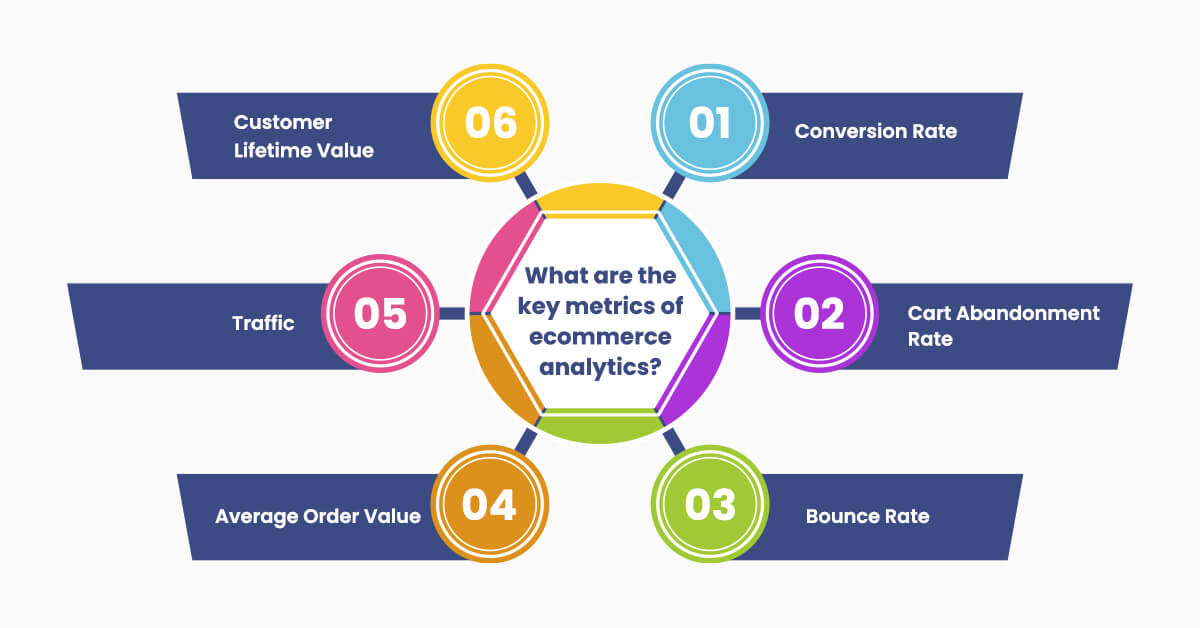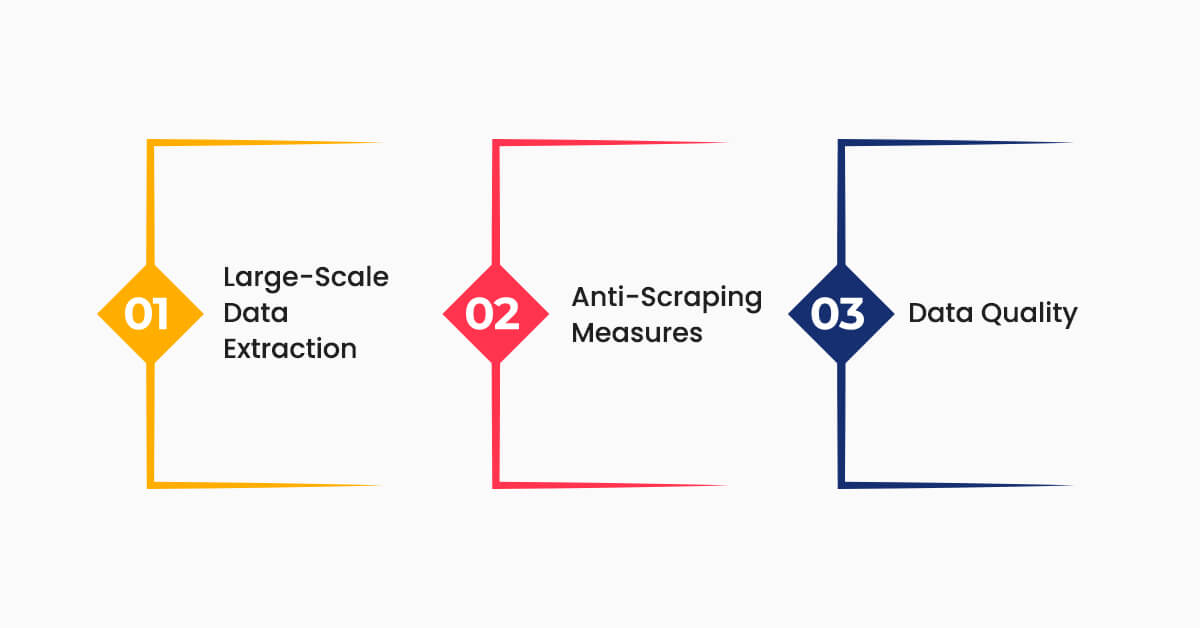
When dealing with the e-commerce industry, it's crucial to focus on shifting customer interests and adaptive competitors. By doing so, you can expect the user penetration to hit 63.2% by 2028, turning a billion people into ecommerce market consumers. This engagement with customer trends and market dynamics will keep you at the forefront of the industry.
The growing volume of online data offers multiple opportunities to make profitable business decisions. With product data scraping, your business can take a step ahead in this competitive industry and gain market insights for effective strategies.
In this content piece, we will understand the role of product data scraping in ecommerce analytics and how to abide by the ethical standards with experts. It will help you to make data-driven decisions, optimize product listings, and beat the competition.
What Is Ecommerce Analytics?
The process of collecting, analyzing, and interpreting the extracted data from an ecommerce store to make business decisions is known as ecommerce analytics. This product data can come from multiple resources like websites, customers, social media channels, and other target platforms.
Look at the image to understand the building opportunities in the ecommerce industry:

Source: https://www.statista.com/statistics/379046/worldwide-retail-e-commerce-sales/
With multiple online tools and strategies, you must pick the one suitable for your ecommerce business and bring quicker results. Whether you plan to focus on website traffic, average order value, conversion rates, or customer acquisition costs.
What Is Product Data Scraping?
Product data scraping is a method that allows you to ethically and respectfully obtain bulk data from target platforms. It's an essential tool for your ecommerce business, enabling you to efficiently gather information from the internet.
Use a scraping tool or website scrapers to handle your data extraction process from the target platform in a structured format. The types of data you can gather in this process are:
| Name | Description | Features | Retail Price | Discounted Price |
|---|---|---|---|---|
| Estimated Delivery | Delivery Choices | Special Offers | Metadata | Combo Option |
| Images | Main Category | Subcategory | Stock Availability | Quantity Availability |
| Reviews | Ratings | Seller Name | Shipping Cost | Shipping Region |
Traditional methods are time-consuming, prone to human errors, and challenging. So, people are looking for effective data scraping solutions. There are data scraping service providers who have robust, automated, and accurate models to make the data extraction process hassle-free.
What are the key metrics of ecommerce analytics?

To measure our ecommerce store performance and determine the segments that need improvement. Some of the metrics you must include during product data scraping are:
Conversion Rate
This is the percentage of people who take the final action you aim for on the website, like buying a product, filling out forms, or subscribing to a newsletter. A higher conversion rate will highlight that your website successfully converts visitors into potential customers.
Cart Abandonment Rate
This is the number of customers who add items to their cart but do not make the final purchase. Improving your checkout process is essential to ensuring a lower card abandonment rate and delivering the best customer deals based on market trends.
Bounce Rate
The critical metric deals with the number of visitors who leave your website after minimal surfing. If this number is high, it shows that your visitors cannot find the solution, which means you need to make changes instantly and deliver a smooth user experience.
Average Order Value
It is the average amount spent per order on your ecommerce store. With data-driven strategies, you can cross-sell and upsell your products to convince users to purchase higher, boosting overall revenue.
Traffic
The total number of visitors on your platform contributes to your platform traffic. With ecommerce data scraping, you can understand the performance of your marketing strategies and other activities to boost your reach.
Customer Lifetime Value
This is how much a customer should spend on your website over their lifetime. It allows you to figure out your investment in customer retention and acquisition. With structured data sets, it will be easier to build a detailed plan for such crucial actions.
How To Handle Ecommerce Analytics With Product Data Scraping?
There are multiple methods to scrape data from ecommerce stores to analyze and take necessary actions. Here is a standard practice for ecommerce data analysis:
List The Data Sources
Start by analyzing the sources that will provide helpful and publicly available information. Here are some of the options available:
- Websites : You can examine your competitors' websites to gather the required data sets and understand customer behavior to make informed decisions.
- Social Media : Following the trends on multiple social media channels is essential when stepping into the market.
- Online Sales Platform : It is essential to look into platforms like Amazon, Shopify, Flipkart, or more that are a source of bulk data updating every second. This allows you to understand customer sentiments and demands in the ecommerce industry.
- CRM Systems : These can be Dynamics CRM consultants, Salesforce, or other relevant customer relationship management systems. They are crucial in monitoring customer data, such as purchase history, communication history, and contact details, if available. This information is highly used in cross-selling and upselling your products.
- Marketing Platforms : Whether you plan to invest in email marketing, advertisements, or other promotional media, compelling data in real-time is essential to meeting customer expectations.
Extract The Product Data
With intelligent product data scraping tools, you should identify the data points to gather and organize for more accessible analysis. Once you finalize the target platforms, it is essential to abide by their terms and regulations while extracting data to avoid any data breaches.
Start ecommerce data scraping to have bulk data sets that are updated in real-time and keep you in trend with the industry demands.
Perform Ecommerce Analytics
After you have the data in the structured format, it is time for in-depth analysis. You can rely on intelligent tools to determine the trends, opportunities, and patterns in the data that will help you enhance the store's performance.
With experts, you can quickly identify the market gaps and take advantage of data-driven decisions to scale your business efficiently.
Monitor And Optimize
As a part of an evolving industry, it is important to regularly track and analyze data to ensure you are making an impact in the market. Change your websites, apps, and social media channels to deliver a user-friendly experience. Ensure you focus on your marketing campaigns to reach potential audiences for higher returns.
What Is The Right Time To Invest In Ecommerce Analytics?
Here are the particular scenarios that help you to make sure that you are making a suitable investment in product data scraping:
- If you are starting an e-commerce business, it is essential to understand customers and their sentiments. E-commerce analytics will help you monitor and analyze data from the beginning to strategize your business's success.
- You may be in a stagnant business situation. Data scraping can help identify areas for improvement and boost your sales. By analyzing customer data to learn about their preferences and needs, web scraping can increase customer loyalty.
- If you plan to launch new services or products, e-commerce analytics helps track their performance, allowing you to make changes instantly and grab the right opportunities quickly.
How Is Product Data Scraping Essential For Ecommerce Analytics?
You can extract key data from publicly available platforms using product data scraping methods. Here are some data points you can consider:
Product Pricing
With real-time data analysis, you can understand whether your prices match the market or require adjustments to improve your business sales. You can also handle price fluctuations and strategize your promotions.
Inventory Management
With automation tools, you can stock your products correctly to avoid losing potential customers and out-of-stock situations. Web scraping also keeps you updated on in-demand products to ensure you invest in the right ones.
Product Attributes
Product color, material, size, or features that explain customer preferences help scale your business quickly. Also, the company should focus on underperforming products to boost their performance and meet customer expectations.
Ratings And Reviews
Customers share their experiences through feedback, videos, and ratings to indicate how well your store meets their needs and where it needs improvement. Positive reviews give you a chance to gain the trust of other consumers, while negative ones help to fix the pain points.
What are the challenges of ecommerce analytics with data scraping?

Large-Scale Data Extraction
Imagine dealing with 200+ subcategories under a single category, which requires accuracy and time to extract all the information. It takes experts' help to filter and refine that data to provide actionable insights.
Anti-Scraping Measures
It is important to note that data collection is not prohibited or illegal, but platforms do want to keep some of the information protected. They might use CAPTCHA and other prevention bots to avoid data access. There are web scraping tools to handle complex anti-scraping measures and bypass blockers using IP address rotation, session management, and IP proxies.
Data Quality
If you do not have a fully equipped tool for product data scraping, you may face challenges in extracting relevant and updated data sets. This can lead to failures and problems with data-based decisions, which can be a significant concern.
How To Handle Ecommerce Analytics Challenges With RetailGators?
Now, with in-depth knowledge about the significance of product data scraping in ecommerce analytics, you understand its effect on business performance. From development, and sales, to marketing, data-driven decisions have proven successful and profitable.
Selecting an appropriate ecommerce data scraping service provider is essential to ensure you get quality data sets. With RetailGators, you get technical know-how support while you can analyze the information in real time with updated data sets as requested. Our professionals ensure that the quality is assessed, legal guidelines are followed, and your business scalability is ensured with data-derived insights.








Leave a Reply
Your email address will not be published. Required fields are marked